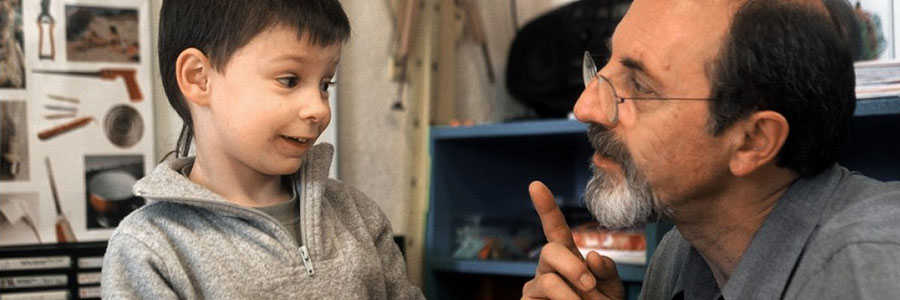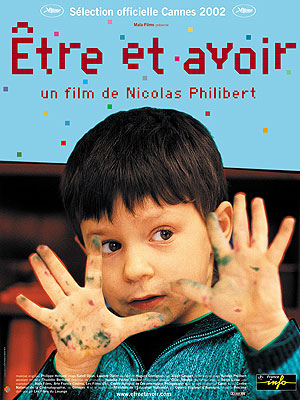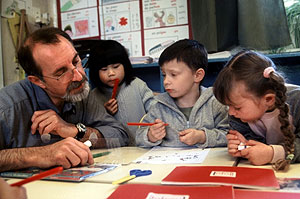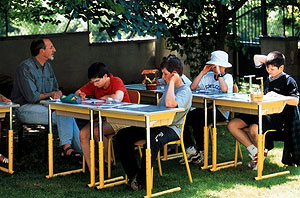
Être Et Avoir

ETRE ET AVOIR (DOCUMENTARY)
Les Films du Losange
Original release: May 19th, 2002
Running time: 104 minutes
Country of origin: France
Original language: French
Director: Nicolas Philibert
Cast: Georges Lopez, Jojo, Olivier, Guillaume

Whether or not we might be peering through rose tinted spectacles, the majority of us look back on our schooldays with great fondness. There can be myriad reasons for this – long lost sporting prowess or maybe a desired return to the heady days when responsibility meant getting your homework in on time. That time – especially my time in primary school – is something that I certainly look back on fondly. I’ve always thought the teachers of my early schooling must have done a bang-up job. Partly because I still have very vivid memories them all and partly because, for the majority of my formative years, I had designs on being a teacher myself.
Admittedly, that didn’t last, but the memory and effect of inspirational teachers does tend to retain a special place in the heart. They can really help to shape what we go on to do later in life; my degree is entirely down to one particular sixth form Classics teacher. This is a sentiment that certainly comes shining through in Nicolas Philibert’s heart-warming and award-winning documentary Être Et Avoir (To Be And To Have).
Spending a year with a small school situated in a rural community, the film’s central figure is the sole teacher, Georges Lopez. We watch as he manages a class with children aged from four to ten with the students stealing much of the screen time. The film balances the material well giving us fully realised stories for several of the students whilst still centring on a man with an extraordinary gift to educate, inform and nurture the youngsters in question. Having done the job for decades, and been at the school in question for twenty years, it’s clear how much knowledge Lopez has not only of interacting with the children, but also of managing a class with kids of wildly varying ability and age.

With very little in the way of talking heads – in fact, it really only approaches this once to get a little back-story out of Lopez – Être Et Avoir feels like an inspector quietly sat in the corner observing the lessons. We see some of the children encounter the number seven for the first time, we watch them writing the word ‘mother’ and we see the older students taking dictations. In its slow pace and lack of intrusion, it seems to mimic the sleepy environment that surrounds its location.
It’s in Lopez’s handling of behavioural issues though that we come to understand how important he’s become to some of these children. I felt like I already knew the young Jojo before the film having seen his cheeky grin on the DVD cover so often, but we see his teacher having to gently grow firmer and firmer with him when he misbehaves. In another scene – the one that stands out the most for me – Lopez deals with two boys who’ve had a fight. It’s an utterly compelling piece of cinema as the  two boys sit in front of the camera being quizzed by their teacher. One of them is constantly battling to hold back tears whilst the other menacingly keeps cracking his knuckles. Though the scene lasts only a few minutes, we’re actually hopeful that Olivier and Guillaume have taken on the advice against fighting, bullying and insulting one another. When they’re due to move up to big school together at the film’s close, they promise to look out for one another, and this is a camaraderie that feels inspired by their teacher.
two boys sit in front of the camera being quizzed by their teacher. One of them is constantly battling to hold back tears whilst the other menacingly keeps cracking his knuckles. Though the scene lasts only a few minutes, we’re actually hopeful that Olivier and Guillaume have taken on the advice against fighting, bullying and insulting one another. When they’re due to move up to big school together at the film’s close, they promise to look out for one another, and this is a camaraderie that feels inspired by their teacher.
There are many moments throughout Être Et Avoir that show the further impact and support provided to the children by this one man who lives above the school. One child is struggling with counting, another has problems with communicating amongst her peers, and Lopez is there to help. The conversation he has with a pupil whose father has health problems is lovely and shows the educator’s deftness in encouraging him to talk about it, comforting him and reassuring him all at the same time.
When the school year ends there seem to be many teary eyes – not least Monsieur Lopez’s – and it’s clear to see the impact he’s had, or is having on these children. When he goes around asking the young students what they’d like to be when they’re older, it’s telling that many respond that they’d like to teach. Although it does seem that some of the students might have to catch up a little when they move on to their new school, he seems to have given them a wonderful over grounding for their education, and for a one man show that’s a great achievement.

Ben Nicholson
Ben has had a keen love of moving images since his childhood but after leaving school he fell truly in love with films. His passion manifests itself in his consumption of movies (watching films from all around the globe and from any period of the medium’s history with equal gusto), the enjoyment he derives from reading, talking and writing about cinema and being behind the camera himself having completed his first co-directed short film in mid-2011.
His favourite films include things as diverse as The Third Man, In The Mood For Love, Badlands, 3 Iron, Casablanca, Ran and Grizzly Man to name but a few.
Ben has his own film site, ACHILLES AND THE TORTOISE, and you can follow him on Twitter @BRNicholson.
© 2022 STATIC MASS EMPORIUM . All Rights Reserved. Powered by METATEMPUS | creative.timeless.personal. | DISCLAIMER, TERMS & CONDITIONS
HOME | ABOUT | CONTACT | TWITTER | GOOGLE+ | FACEBOOK | TUMBLR | YOUTUBE | RSS FEED
CINEMA REVIEWS | BLU-RAY & DVD | THE EMPORIUM | DOCUMENTARIES | WORLD CINEMA | CULT MOVIES | INDIAN CINEMA | EARLY CINEMA
MOVIE CLASSICS | DECONSTRUCTING CINEMA | SOUNDTRACKS | INTERVIEWS | THE DIRECTOR’S CHAIR | JAPANESE CINEMA





